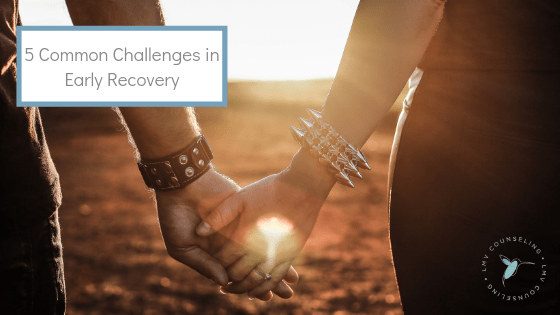Everyone who decides to stop using substances, whatever the reason is, will run into challenges in the first few weeks of living abstinent. It’s a new way of life and it will take often times changing people, places and things. We have listed five of the most common situations encountered in the first few weeks of making a change. We have also provided some suggestions to help you handle these times. If you’d like to go deeper, sign up to have 10 ways to change be sent to you.
Common Challenges
1. Friends and associates who use:
It is likely that if you’ve been using any substance for a period of time, you know other people who do too. This can be challenging when you are trying to adopt a new lifestyle. You may want to continue to spend time with these people. Often times, the individuals who you have been using or drinking with are people that you feel a close bond to because of dangers you’ve been through or funny experiences you’ve had while high or drunkAnger and irritability:
2. Anger and Irritability
Small events can create big feelings. You may find your anger seems to be too much for the situation. Maybe you are very irritable over the smallest things. You may find that seemingly silly events have your mind preoccupied and you can’t seem to shake it. This anger and irritability can lead to a return to drug use or drinking. There is nothing wrong if you are experiencing anger and irritability. It’s a normal and natural withdrawal process from a substance that you’re used to taking. This can even occur in those who drink on the weekends or have occasional use.
3. Substances in the home:
You have decided the stop using but others in your household my still be using. Or perhaps areas of your house remind you of using or drinking. For example, you’ve decided to stop drinking alcohol but your spouse continues to buy and consume alcohol. It will be much harder to remain abstinent if your partner continues to drink or have the substance around your home. This isn’t to say that you ABSOLUTELY CANNOT resist drinking, it’s simply that over time and with repeated exposure you’re more likely to return to drinking.
4. Boredom and loneliness:
Stopping substance use frequently means giving up activities that you used to find fun and enjoyable. It can be difficult to learn a new way of living at first. You may have to say goodbye to hobbies- like your craft beer forum that you used to take part in or spending time with others who use.
5. Special occasions:
This is a biggie. Parties, holidays, dinners, and business meetings can all include substance use as a natural part of the celebrations. Alcohol can be tough to avoid during these situations. For most people in early recovery, it is especially tough around the winter holidays and festivities. It can be challenging to be in that environment and also challenging if you don’t go.
 There are solutions
There are solutions
It doesn’t always have to be this way. There are ways to help with the early challenges. Take a look at some of the solutions and suggestions below to help adjust to your new lifestyle.
1. Friends and associates who use:
Try to make new friends! This may not be something you’ve thought about since you were younger but get out there. Try new things, meet new people. Participate in new hobbies or activities that will expose you to people that may be abstinent or are open to engaging in activities substance free. Plan sober activities with friends and family. You choose the activity! Instead of spending time at a brewery, suggest a visit to the park instead. 12 step or mutual help meetings in the community can also be an excellent way to get to know new people in an abstinent environment.
2. Anger and irritability:
Hang in there and remind yourself that this is a normal and natural healing of your brain. Strong and intense emotions are a natural part of recovery. You aren’t weird or mean. Manage that anger by engaging in exercise. Exercise is an excellent outlet and will also provide the feel good dopamine that helps soothe irritability. Also, talk to a counselor or a supportive friend. Sometimes all it takes is being able to talk through some of our issues with someone who cares for us.
3. Substances in the home:
Get rid of all drugs and alcohol in the home. Dump all paraphernalia. This includes shot glasses, bowls, pipes, lighters, cotton, straws, etc. Get rid of that secret stash too for “just in case.” You increase your risk of using with these items around. Also ask others in your home to refrain from using and drinking at home. If you continue to have a problem with substances where you’re living, it’s time to think about moving out for a while. Your recovery is more important than staying and living in a home where your recovery is at risk daily.
4. Boredom and loneliness:
Begin to schedule activities in your day. Your time is no longer taken up by substances which means all those things you’ve been putting off, you now have time for! Starting at the beginning of the week write down activities you’d like to complete on specific days. This may include behaviors like taking your dog for a walk in the mornings and working on cleaning out the garage this upcoming weekend. Also, think about activities you enjoyed prior to drinking or drugging. Revisit some of those old hobbies to rekindle a passion. Try a new hobby! You can also stay busy by attending 12-step or mutual help community meetings. These meetings are available online, in podcasts, and on you tube but the connection that comes from in person meetings is meaningful.
5. Special occasions:
Have a plan before going into a celebration for why you’re not drinking or using substances. It does not have to be elaborate. You can keep it simple or provide as much explanation as you want. A response of, “I’m just not feeling it tonight” or “I’m actually in recovery now. I’m staying away from using” are perfectly acceptable. Try starting your own abstinent celebrations instead. Is it your birthday? Why not celebrate with an ultimate game of adult laser tag or going to a baseball game sober? Another way to prepare for celebrations is to have your own transportation to and from events. This way if you begin to become uncomfortable or start feeling deprived you can leave. The beauty of not using substances is you have the freedom to leave when you want, get a good night’s rest, and wake up without any guilt or shame the next day!
We hope this helps get you started on your path to recovery. These are common challenges and if you are experiencing them you are not alone. It can also be helpful to have a trained clinical addictions specialist on your side when trying to make changes in your life. If you’re ready to make a change to your substance use or maybe you want a little assistance, let’s get started. We’re here to help get you started in substance abuse counseling in Wilmington, NC.

